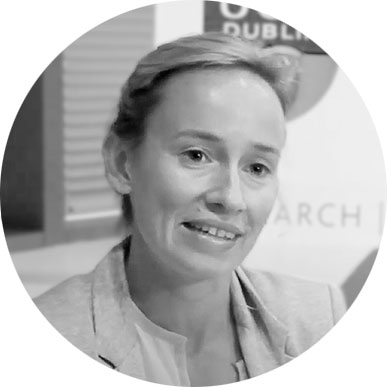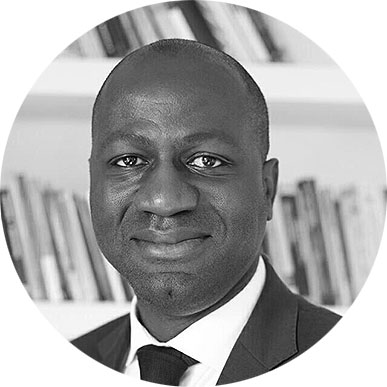
Elena Moore
Chair
Elena Moore is an associate professor in the Department of Sociology at the University of Cape Town and Director of the Families and Societies Research Unit (FaSRU), South Africa. She specialises in the sociology of the family; she holds a Masters in Applied Social Research and a PhD from Trinity College Dublin. Recently, she partnered with other universities and global networks on care, money, gender and families. She is the author of Divorce, Families and Emotion Work (2017) and (with Chuma Himonga) Reform of Customary Marriage, Divorce and Succession in South Africa (2015), as well as numerous journal articles and book chapters. She was appointed as the NRF Replacement Chair in Customary Law, Indigenous Values and Human Rights for 2018 and 2019.

Patience Mususa
Patience Mususa is a senior researcher at the Nordic Africa Institute, Sweden. She conducts research on mining and urbanisation, and on the politics and practice of urban climate mitigation and adaptation efforts. She has a PhD in Social Anthropology from the University of Cape Town, South Africa, and trained as an architect at the Copperbelt University, Zambia. She has pursued postgraduate study in material anthropology and development practice at the University of Oxford and Oxford Brookes University on a Rhodes Scholarship. She is a founding member of the Africa Studies in Europe (Aegis) Collaborative Research Group (CRG) on African Urban Dynamics, and a member of the CRG on Resource Extraction in Africa.

Njoki Wamai
Dr Njoki Wamai is an assistant professor at the United States International University–Africa (USIU), Kenya. Previously, she was a post-doctoral research associate at the Centre for Governance and Human Rights (CGHR) in Cambridge’s Politics and International Studies Department. She holds a PhD in Politics and International Studies from the University of Cambridge; she was Gates Cambridge Scholar and won the Bill Gates Sr. Prize, which recognises outstanding research and social leadership. Njoki is a feminist and scholar-activist.

Djiby Thiam
Djiby Thiam is an associate professor at the School of Economics at the University of Cape Town, South Africa. His research focuses on environmental and resources economics, agricultural economics, and development economics. His work has been published in international journals such as Agriculture and Food Economics, Agroforestry Systems, Water Economics and Policy, Water Resources and Economics, Energy Policy, and Water Policy. He is a member of the Editorial Board of the academic journal Water Economics and Policy. He has consulted for the United Nations and governments across Africa on energy, water, development economics and policies and provided review reports for the United Nation's Intergovernmental Panel on Climate Change (IPCC). He heads multiple national and international projects funded by institutions in South Africa (NRF, GCGC) and Canada (IDRC). He has a wide range of international work experience from Germany, the Netherlands, US and France.

Emmanuel Mutisya
Dr Emmanuel Mutisya is a seasoned project manager, sustainability specialist, education expert and strategist in international development policy. He is a program coordinator and consultant for education and skills development at the African Development Bank. He is also a visiting professor at the University of Nairobi in Kenya and the First Chairperson of the National Diaspora Council of Kenya. Prior to this current role, he was a project manager at the United Nations University in Japan, where he coordinated the Education for Sustainable Development in Africa (ESDA) program and the African Youth Entrepreneurship Society (AYES) initiative. He holds an MSc in Mathematics from Karlstad University in Sweden, an MA in Public Administration from the International Christian University in Japan and a PhD in Sustainability Science from the University of Tokyo.

Olumide Abimbola
Olumide Abimbola is a political economist with experience in trade policy, regional integration and extractive resource management. He is the Executive Director of the Africa Policy Research Centre, Germany. Until recently, he was the Business Development Lead at the CONNEX Support Unit, a G7 initiative. He previously worked on trade and regional integration at the African Development Bank. He holds a BA in Communication and Language Arts from the University of Ibadan, Nigeria, an MA in Development Studies from Uppsala University, Sweden, and a PhD in Social Anthropology from the Max Planck Institute, Germany. He is co-founder and trustee of the Liberal Forum, a Nigerian think-tank. He serves on the board of the Institute for Money, Technology and Financial Inclusion (IMTFI), United States.

Tamara Enomoto
Tamara Enomoto is a professor at the Organization for the Strategic Coordination of Research and Intellectual Properties, Meiji University, Japan. She holds a PhD in Human Security (University of Tokyo), MA in Conflict, Development and Security (University of Leeds), MA in Development Studies (University of Leeds), and BA in International Relations (University of Tokyo). She was in charge of policy and research on arms control, security and humanitarian issues at Oxfam (2003–2015), and has been leading the Arms and Civil Society Research Forum, an open policy and research network for practitioners, academics, media and others on arms control issues, since 2007. She has written extensively on conflicts in northern Uganda, transitional justice, critical security studies, and arms control, and has managed complex interdisciplinary research projects. Her recent publications include Weapon Taboos: Genealogies of Pariah Weapons (2020) and The Arms Trade Treaty: The Self, Sovereignty, and Arms Transfer Control (2020).

Murray Stanford
Murray Stanford is a social anthropologist and Head of Ethnography at IPSOS in Dubai, United Arab Emirates. He holds a B SocSci in Sociology, an honours degree in Social Anthropology, and a Masters in Social Anthropology from the University of Cape Town, South Africa. He is also a Potter Fellowship winner and member of the research group “Fixing the City”. He specialises in business anthropology and the study of youth culture, providing strategic direction to corporate clients based on a consumer-centric approach to marketing strategy. He has conducted research on gender, youth, AI and machine learning, popular culture and masculinities in the Arab world.

Carl Manlan
Carl Manlan works at the intersection of public, private and civil society sectors. He is the Chief Operating Officer of the Ecobank Foundation, responsible for the bank’s social impact engagement with the communities in which it operates in Africa. Prior to his current role, he led a public-private initiative to support an African response to Ebola in West Africa. As a Mo Ibrahim Fellow at the Economic Commission for Africa, he focused on industrial and agricultural policies designed to accelerate transformation of the African continent. He holds a Master of Public Administration from Harvard Kennedy School, US and is an Aspen Institute New Voices Fellow. He writes on African economic transformation.

Euclides Gonçalves
Euclides Gonçalves is a researcher and Director of Kaleidoscopio – Research in Public Policy and Culture, Mozambique. His research focuses on governance, bureaucratic processes and political rituals; his current research examines public encounters with bureaucratic power through the analysis of policy and identity documents. His published materials include A Companion to the Anthropology of Africa, Orientações superiores: Time and Bureaucratic Authority in Mozambique, and Expressões alternativas das vozes dos cidadãos: Música e comentário social em Moçambique.
